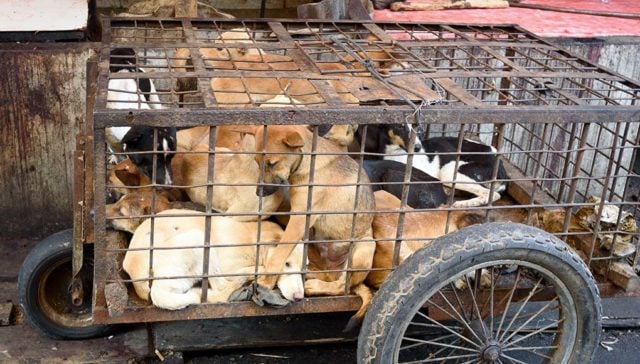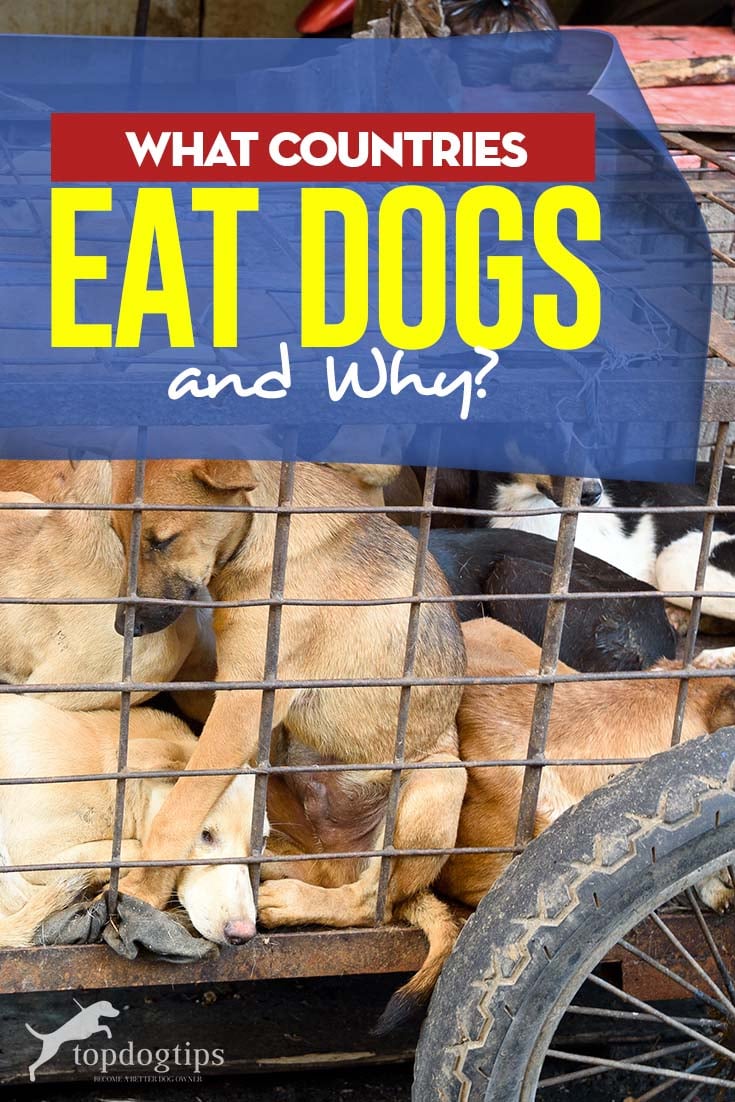
Table of Contents
Here's a sad truth: some countries eat dogs up to this day, and their governments don't do anything to stop this.
We're a community of dog lovers here.
We love our pets and treat them as a furry family member.
So it's deeply saddening and bothering that farming, stealing, and brutally slaughtering these innocent dogs are still commonplace in some parts of the world.
In 2023, there are still 17 known countries where dogs are regularly eaten.
In some countries like China, Vietnam, and North Korea, where millions of dogs are eaten by humans each year, this is far more common than anywhere else.
Below, we'll list 17 known countries (alphabetically) that regularly consume dog meat and why they're eaten there.
Links on how you can help stop the trading and eating of dog meat are also provided.
ALSO READ: The Business of Dog Smuggling and How It Works
17 Countries That Ate and Still Eats Dog Meat
1. Cameroon
There isn't much written about the reasons and practices of dog eating in Cameroon.
According to a report by the Humane Society International, an estimated 30,000 dogs are killed and eaten in the country each year.
The consumption of dog meat is particularly prevalent in the country's southern regions, where it is viewed as a cultural tradition and a valuable source of protein.
There are several reasons why some Cameroonians consume dog meat, also known as 404 in this African country.
For many, it is a cultural tradition that has been passed down through generations.
Some believe that dog meat has medicinal properties and can cure various ailments, including malaria and rheumatism.
Others view it as a delicacy and a symbol of social status.
Other times though, they believe that 404 particularly helps with libido.
2. China
This Asian country is the largest consumer of dog meat in the entire world.
According to a 2017 report by the Humane Society International, it is estimated that 10 to 20 million dogs are killed and consumed here each year.
Consuming dog meat in China is legal, and there are no guidelines or regulations in place for the slaughtering, manufacturing, and eating of dogs.
Many or most dogs that are killed and eaten there never receive vaccinations.
Many have lived in extremely poor conditions, causing these dogs to have a wide variety of diseases that can make the people who consume them sick.
Dog meat has even caused outbreaks of the canine parasitic Trichinella infection among the Chinese.
Dog meat has been consumed by Chinese citizens for thousands of years and is believed to have medicinal properties.
In Northern China, dog meat is believed to promote warmth in the body when consumed.
That's why it's especially popular to eat in the winter months.
In Southern China, dog meat is often readily available and openly served by restaurants, where dog farms exist for this purpose.
These dogs are bred and often kept in bad, unsanitary conditions.
There have also been many cases of family dogs being stolen and served as meals in restaurants in China.

Not surprisingly, China is the country in which the Yulin Dog Meat Festival takes place.
Every year, approximately 15,000 dogs are slaughtered and eaten during this 10-day festival.
While the organizers of the festival claim that only dogs that are bred specifically to be eaten are consumed at this festival, it is clear that many dogs are lost or stolen pets, as evidenced by their collars and dog tags.
Note that this is not a traditional and cultural practice.
Instead, it was a gimmick started by dog meat traders to boost their sales.
The dogs that are consumed at the Yulin Dog Meat Festival are often boiled or burnt alive, even clubbed, and beaten to death.
Apparently, they believe that having adrenaline pumping through the tortured, burned, and beaten dog’s body makes the meat taste better.
There are many countries and organizations that are working tirelessly to ban the Yulin Dog Meat Festival.
3. Democratic Republic of the Congo
Dog meats used to be consumed only by some tribes from the Kansai province in Congo, while other tribes in other regions consider this as dirty or taboo.
However, around 2011, most Congo people were hit hard by the rising prices of cattle meats.
Unfortunately for dogs, attitudes in the country have changed since then.
While those who eat this meat said it doesn't seem to have any harmful effect on health, there was prior testing done in the country that confirmed at least 156 dogs in this country had been infected with the Ebola virus before.
While these dogs showed no signs of illness and seemed to have developed antibodies for it then, they were still capable of transmitting the virus.
Up to this day, Ebola still continues to kill infected individuals in Congo and its nearby countries in its 2022 outbreak in these African countries.
4. Ghana
Many tribes and cultures in this African country eat dog meat, especially in the northern part of Ghana.
For some tribes, dog meat is considered a delicacy.
They eat dog meat as a “courtship stew” supplied for the royal offspring and lineage of a king.
For others, dogs are hunted and consumed as a symbol of friendship and camaraderie, with the dog head going to the winning tribe as a trophy.
In 2021, the country saw high demand for dog meat, which was said to be popular among younger people.
Currently, hundreds of dogs are still abducted and slaughtered every market day.
5. India
The people of Nagaland in eastern India consider it part of their culture and tradition to eat dog meat.
This area considers dog meat to be of high nutritional value and to have medicinal properties, providing immunity against different diseases.
Nagas mostly hunt with them, but when the dogs die, it's customary to gift the carcass to relatives for consumption.
They also held their own version of the dog meat festival in China, where thousands of dogs are slaughtered to be eaten.
Although it was mainly frowned upon in the mainland, the Human International Society India estimated that more than 30,000 stolen and lost dogs were still captured and clubbed to death yearly to be eaten.
In 2019, a landmark decision was made by the government of India: ban and illegalize the dog meat trade.
This is in response to the relentless call to end the brutal trade that started in 2016.
6. Indonesia
Dog meat was regularly consumed in several areas of Indonesia.
In Bali alone, a popular tourist spot, around 60,000 to 70,000 dogs were being killed for consumption yearly.
The illegal transportation of dogs was said to be the main cause of the spreading of rabies in the area.
And if you visited this wonderful island sometime in or before 2017, you might have unknowingly eaten dog meat.
In 2017, Animals Australia went undercover to investigate the dog meat trade here, just to discover that vendors had been selling their ‘chicken satay' to tourists made with dog meat, among other local cuisine.
Since then, the call for the dog meat trade in Indonesia to end intensified.
But because of the inaction of the national government, local states took matters into their own hands.
Local laws have been passed to ban the trade explicitly in their jurisdiction.
The following localities currently have a law or ordinance in place:
- Karanganyar Regency, Central Java, as of 2019
- Sukoharjo Regency, Central Java, as of 2021
- Jakarta (capital of Indonesia), as of March 2023
Dog meat vendors in local tourist spots like Bali are also being closed down.
The most recent development this July 2023 is the total banning of dog and cat trade in an infamous North Sulawesi Market, where butchers are known to slaughter dogs in the most inhumane way possible.
On the other hand, some other parts of Indonesia (mostly non-Muslim communities) are still ongoing with this inhumane trade.
7. Morocco
Morocco is an Islamic country. And as we know, Islam considers dogs as ‘unclean' animals.
But ironically, poorer areas in the country have been eating dogs because they can't afford other types of meat.
And they do this under the guise of other meats or in a sausage.
Dog cruelty in the country is still rampant up to this day.
In fact, just earlier this year, bloody and brutal videos were caught in Tangier wherein alleged “government assassins” shot, poisoned, and killed hundreds of street dogs in broad daylight.
This was supposed to “clean the streets” in preparation for Morocco's bid to host the FIFA World Cup.
8. Nigeria
Just like in Cameroon, dog meat is also called 404 in Nigeria.
This African country also made it to the top third spot of the countries with the highest dog consumption rate in 2022.
Dog meat is still believed to have medicinal powers, and is therefore consumed by quite a few groups of Nigerians mostly from the south-eastern part of the country.
These ‘delicacies' are often served in drinking joints.
And this despite several reports that revealed how humans are dying of rabies in Nigeria due to the dog meat trade and consumption.
Nigeria coming to the third spot isn't surprising; what's surprising, though, is dog meat consumption is still prevalent in the country despite the petitions to ban the dog meat trade.
In July 2021, about 18,000 people signed a petition on Change.org.
In comparison to other countries in this list, though, like Vietnam and China, Nigeria has a law about Animal Protection.
Frankly speaking, though, it doesn't really amount to anything if it's not being enforced properly.
9. North Korea

Korean cultures have long eaten dog meat, and is still consumed nowadays, especially in North Korea.
They believe that eating dog meat is beneficial to keep your stamina, especially during summer.
And unlike in other countries where dog meat consumption is only done in specific, mostly small, parts of the country, North Korea is different.
In fact, they even have lavish restaurants that exclusively serve dog meats.
In 2020, North Korean leader Kim Jong Un reportedly called for all dog owners to surrender their dogs to be given to petting zoos or to be sold to restaurants.
This move is to appease the mass amid food shortages in the country and not feed into the ‘capitalist decadence' and ‘bourgeois ideology.'
Purchasing dog meat for consumption is so common in North Korea that the government even added it to its list of 100 items with “fixed” (or government-determined) prices.
And if you're wondering if it feeds the poor or the food insecure, not really.
It seems like only the elites and the men in position can feast on expensive dog meats.
Read more about the cultural and legal aspects of the trade, slaughter, and consumption of dog meat in both North and South Korea and how it can potentially be combated in the following report.
10. Philippines
The first country featured on this list with a complete and total ban on dog selling, buying, and consumption, the 1998 Animal Welfare Act in the Philippines dramatically decreased the dog meat trade in the country.
This law was further strengthened when it was amended in 2011 with heavier penalties.
However, that's not to say it's not happening anymore.
In fact, the illegal dog meat trade is still rampant, especially in rural Philippines, where access to more acceptable protein sources is scarce and, therefore, expensive.
Just like in other countries, dog meat is also believed to be an aphrodisiac in the Philippines and is usually paired with liquors.
It is not tolerated by local and the national government as it's considered ‘hot meat,' meaning it did not pass any inspection, thus, possibly disease-carrying meat.
Despite these efforts, illegal traders still follow where the money is, which, sadly, is in slaughtering dogs for food.
11. Polynesia (Kingdom of Tonga)
Eating dog meat was historically commonplace in Tahiti, Hawaii, and all of the Polynesian islands.
But nowadays, this practice seems to have ceased in most Polynesian territories, with the exception of the Kingdom of Tonga.
This country is a relatively small Polynesian island, about 4 times the size of Washington, D.C.
Same to the reason of other countries for eating dogs, Tongans used to eat this meat for survival.
The poor and food-insecure families who don't have access to more expensive meats mostly rely on dogs to appease their hunger.
But nowadays, it's not the case.
More Tongans now have access to different meat and food sources.
So in the Kingdom of Tonga, eating dogs nowadays, in truth, is more like a craving than a need.
And they aren't just limited to their country.
Tongans who have settled in other parts of the world, like Australia, New Zealand, or the United States, also practice this.
12. South Korea
People are now falling in love, not just with South Korean music and entertainment but with their food.
So how would you feel when you found out that South Korea still has cases of dog consumption even to this day?
To clarify, though, this practice is already dwindling as more and more South Koreans are becoming pet owners.
In fact, there has been growing support among the people to ban dog consumption.
However, as of 2022, there are still about 1,150 commercial dog farms operating in the country that raises over half a million dogs for consumption.
But in comparison, that number has actually declined by 35% in the last 5 years.
In 2018, the Humane Society International reported that South Korea is the number one country where dogs are regularly and vigorously farmed for human consumption.
To date, the HSI has helped close 18 dog meat farms in South Korea.
Read the following document about the state of the dog meat trade in South Korea and the efforts to eliminate it from HeinOnline.org.
13. Switzerland
It is illegal to slaughter dogs in order to sell their meat commercially in Switzerland.
However, it's legal to keep and slaughter them if, one, it's done humanely, and two, it's for personal consumption.
In fact, some families in rural/poor areas keep dogs with the intention of eating them later as a less expensive source of meat.
Yes, there are still poor and rural areas in this country, despite being one of the world's most expensive places to travel to.
In Switzerland, dog meats are usually turned into traditional sausages or jerky.
Variations of the cured meat dish Mostbröckli, traditionally made with beef, are also sometimes made with dog meat.
One of the favorite types of dog meat among Swiss citizens comes from a dog closely related to the Rottweiler.
They also do the same practice with cat meat.
14. Timor-Leste
In this country, eating dog meat is very popular, and it is considered a delicacy.
And just like some of the developing countries in this list, they started eating dog meat because of poverty and food scarcity.
This alternative to the more expensive meats was introduced to Timor Leste by the Indonesians when the invasion happened just a couple of years ago.
You can't really blame the people when they were left with no option but to eat anything they could get their hands on.
Currently, people still eat dog meat in Timor Leste, despite wider access to other meat protein sources.
You can even buy local dishes made from dogs in canteens and hole-in-the-wall restaurants, where they label it “RW.”
RW stands for rintek wuuk, which means “fine hair,” pertaining to a dog's fur or coat.
In June 2023, Timor Leste was preparing for a rabies outbreak following an increase in cases in Indonesia's South Central Timor.
However, The Vocal Point of International Health Regulations in Timor Leste stated that “eating processed/cooked dog food meat” won't bring the rabies virus because the virus and bacterias supposedly “dies when cooked.”
Good luck with that, I guess.
15. Thailand
Thailand also has an existing law that illegalizes the dog meat trade in the country.
Sadly, though, there are still communities in the country that completely ignores this ban.
This is despite the upturned noses of other pet-loving Thai people from the middle to higher class.
Not only do some (not all) locals consume dog meat, but they also export it illegally, mostly to Laos, Vietnam, and China.
The practice of dog meat consumption is said to have started from Vietnamese ethnicities that resided in northeastern Thailand some decades ago.
However, only about 20 to 30 years ago, it became a huge commercial trade, which the government and animal welfare groups have been tracking ever since.
Because of the stealing and horrific maltreatment of dogs in Thailand, several advocacy groups have been formed to fight against this issue, as well as against the health epidemics related to the consumption of dog meat in Thailand.
One of the most popular ones is the Soi Dog Foundation (Soi means alley in Thai) and the Watch Dog Thailand Foundation.
Both are still active in upholding animal rights in the country.
16. Uzbekistan
Uzbekistan has always been notorious for the level of animal cruelty that happens in the country, despite the now tougher penalties.
There still are dog and cat abuse incidents happening in the neighborhood, with some being recorded and streamed on social media sites.
Smuggles have also reportedly disguised as animal welfare advocates so they can freely get unsuspecting dogs from owners or on the streets for a “better shelter,” to later find out that they're living in far worse conditions and getting prepped for butchering or selling.
Although the eating of dog meat is less common in this country as compared to others, people do choose to consume dogs due to the belief that they have medicinal value.
You can read more about this topic in the academic article Uzbekistan: Meat is Medicine.
Activists and enthusiasts are still working hand in hand to lobby for better conditions for these stray animals.
They successfully built two large and legit animal shelters with veterinary services and programs.
But sadly, as they say, it looks like the humane treatment of animals in Uzbekistan is still far off from the realities on the ground.
17. Vietnam

Approximately 5 million dogs are slaughtered for consumption in this country annually, making it the second largest consumer of dog meat, right behind China.
A large majority of the dogs that are eaten in Vietnam are stolen pets that are treated poorly and brutally killed by those who capture them.
And yes, up until now, there are no national laws established in the country to impede the dog meat trade.
However, one city in Vietnam took the initiative to ban the sale and consumption of both dog and cat meat in 2021—Hoi An City.
There are also initiatives to satisfy a Vietnamese's craving for dog meat with an alternative: Giả Cầy, which translates to “Fake Dog meat.”
It's made of pork feet cooked in different herbs and spices which they often use (and associate) with dog meat.
In the Vietnamese culture, eating dog meat is believed to bring good luck to those who eat it, increase a man’s libido, and is served best when partnered with liquor.
There is still a huge black market in Vietnam for the trade of dog meat that can be bought and sold for a premium price, making stealing, brutally murdering, and selling a dog’s meat a profitable and popular business in this country, despite the outbreak of rabies (PDF) related to the dog meat trade.
Before You Go…
Ultimately, it all boils down to our cultural and situational differences.
While it's deeply saddening for us, dog parents, that this practice still happens in other parts of the globe.
As a dog parent, I could not and will not eat dog meat in any form, in any way.
And what I find more unacceptable than the consumption is how these dogs were being slaughtered—cruelly and very inhumanely.
What are your thoughts on this?
Do you think it's people's right to eat whatever they want to eat?
Or do you think their government should take a more active approach to ban the dog meat trade?
Let us know in the comments section!
Interested to read more articles with similar topics? Check out our recommended reads below!
Related Articles:
- China's Yulin Dog Meat Festival Sparks Controversy; Witness Says Pups Are Burned Alive
- South Korea May Finally Ban Eating of Dog Meat this Month
- Pet Food Manufacturing Regulations – USA vs. Canada vs. Europe vs China
Pin and share with other dog owners:













